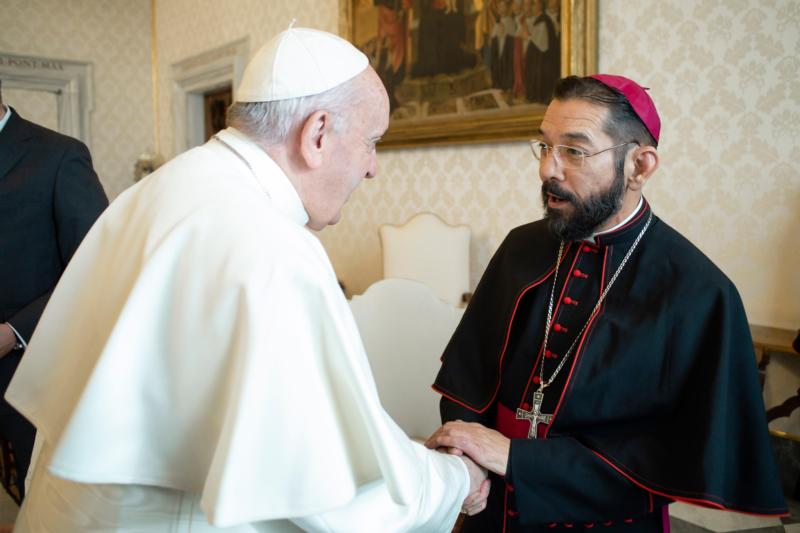LOS ANGELES (CNS) -- The church's credibility depends on how the institution as a whole and Catholics individually respond "with love that gives without asking for payment in return," Bishop Daniel E. Flores of Brownsville, Texas, said in advance of his participation in the annual Los Angeles Religious Education Congress.
"This kind of love is the response to the human need, a call to alleviate, to the extent we can, the distress of another," Bishop Flores told Angelus, the online media platform of the Archdiocese of Los Angeles.
"It's our response to Christ, who speaks to us from the cross and through the resurrection so that our hearts are touched by the mystery of love. That's evangelizing," he said.
The congress takes place Feb. 20-23 at the Anaheim Convention Center. Bishop Flores is scheduled to preside at an English language Mass for the evangelization of all people Feb. 21 and to deliver an address in Spanish on the theme of mercy Feb. 22.
He has been the bishop of Brownsville for a decade, working in one of the poorest U.S. dioceses. In addition to serving U.S. residents, he has been a leader in ministering to migrant people from Mexico and Central America, emerging as an outspoken advocate for immigrants, the unborn and the poor.
That experience has shaped how he views the importance of Catholics evangelizing and responding with mercy to people in need every day of their lives.
"Christ says, 'Love one another even as I have loved you.' And it's that responsiveness to Christ and to the distress around us that are inseparable," Bishop Flores explained.
Unfortunately, he said, the importance of love often is overlooked in order to adhere to political views to the detriment of human suffering. Instead, Bishop Flores urged people to remember the Gospel.
"Our challenge is to let the teaching of the church, our faith, the Gospel, the person of Christ himself, to be the light by which we organize our politics and our involvement in the political field, and in the political world," the bishop said.
"We have to be involved in society, but the Gospel has to be the principal lens through which we judge things. But sometimes -- and we aren't even always conscious of it -- we allow our politics to be the lens by which we judge the Gospel. And I think that's one of the sources of the division within the body of the church."
When it comes to "hot-button" issues such as immigration, abortion or the death penalty, Bishop Flores invited people to "look at these issues first in terms of the basic responsibility of a Christian to respond to the human being in front of you with mercy and compassion."
"That doesn't mean that there's no law or order when it comes to these things," he continued, "but rather that when it comes to the person we're looking at, especially the person in distress, that our response should be as to Christ himself. And then we can figure out how to make the policies in a way that expresses that sense of concern and mercy."
Bishop Flores called people to respond to "human reality first" with mercy and love "and then craft the laws that respond to those things in a compassionate way in which the suffering of the human person does not get eclipsed in our conversation."
At the same time, he added, people within the church are responsible for treating each other "calmly and without rancor," something he admitted is difficult "when political tensions get very, very high."
Throughout his years of ministry, Bishop Flores has found hope in seeing people in his diocese and elsewhere responding generously to each other, citing volunteers who help families, wash clothes for migrant children or mop floors in a shelter.
"I see a lot of people who are inspirations to me, who just do what they can to help others," he said. "Yes, there is suffering and distress. But in Spanish we say, 'Los pobres son los mas generosos' -- that the poor are often the most generous in terms of responding to the situation of somebody else who's in an even worse condition. That's what I see, and to me, that's a sign of how God's grace can change our response.
"We can have hardened hearts, or we can have fleshy hearts -- that's the kind of option that the Scriptures give us," he said. "If we want fleshy hearts, we have the Holy Spirit to give us that, and then can we do something. That's what gives me hope."
The bishop reminded the church that Jesus urged his followers "to do good to those who can't repay you."
"I think that's at the heart of the credibility of the church's witness, the witness of grace in the world," he said.
"There's a great need in the church for us to recover our own sense that there's something new in the world called the grace of Christ crucified and risen from the dead, and we have to make that visible by our own generosity.”








